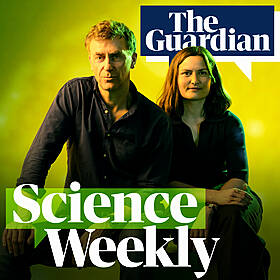
Love motels and gridlocked talks: all the news from Cop16
31 October 2024 - 15 minsBiodiversity correspondent Phoebe Weston takes Madeleine Finlay through the news from the UN Cop16 biodiversity summit in Cali, Colombia. Countries are wrangling over funding to protect nature and who should profit from the natural resources of the world’s least developed nations. Help support our independent journalism at theguardian.com/sciencepod

‘Everything is quagga mussel now’: can invasive species be stopped?
On a recent trip to Lake Geneva in Switzerland, biodiversity reporter Phoebe Weston witnessed the impact of one of the planet’s most potent invasive species, the quagga mussel. In just a decade the mollusc, originally from the Ponto-Caspian region of the Black Sea, has caused irreversible change beneath the surface of the picturesque lake. While ecologists believe invasive species play a major role in more than 60% of plant and animal extinctions, stopping them in their tracks is almost impossible. Phoebe tells Madeleine Finlay how invasive species spread, how conservationists are trying combat them and why some think a radical new approach is needed.. Help support our independent journalism at theguardian.com/sciencepod
16 mins
5 February Finished

Why are women turning to testosterone?
Just like men, women are increasingly being told by online influencers that the classic symptoms of middle age could be down to low testosterone. In the second part of this miniseries exploring the hormone, Madeleine Finlay finds out what testosterone supplementation is doing for women. She hears from science journalist Linda Geddes, who is taking testosterone for low libido, and from prof Susan Davis, a consultant endocrinologist and head of the Monash University Women’s Health Research Programme. Susan explains what the evidence really shows about the benefits and risks of women taking testosterone. Help support our independent journalism at theguardian.com/sciencepod
15 mins
3 February Finished

Are men being misled over testosterone?
If TikTok influencers are to be believed, testosterone, or T, is the answer to everything from fitness frustrations and fatigue to low libido. But doctors are warning that social media misinformation is driving men to seek testosterone therapy that they don’t need. This in turn comes with risks for health and fertility. In part one of a miniseries exploring the popularity of testosterone, Madeleine Finlay hears from Prof Channa Jayasena of Imperial College London, who is chair of the Society for Endocrinology, about how this craze is manifesting in NHS clinics, and from ‘Sam’ who tells Madeleine about his own journey with the hormone. Help support our independent journalism at theguardian.com/sciencepod
17 mins
29 January Finished

Has the world entered an era of ‘water bankruptcy’?
Last week, a UN report declared that the world has entered an era of ‘global water bankruptcy’ with many human water systems past the point at which they can be restored to former levels. To find out what this could look like, Madeleine Finlay speaks to the Guardian’s diplomatic editor, Patrick Wintour, who has been reporting on Iran’s severe water crisis. And Mohammad Shamsudduha, professor of water crisis and risk reduction in the department of risk and disaster reduction at University College London, explains how the present situation arose and what can be done to bring water supplies back from the brink. Help support our independent journalism at theguardian.com/sciencepod
18 mins
27 January Finished

How positivity affects health, the rise of scabies and bovine intelligence
The Guardian’s science editor, Ian Sample, talks to Madeleine Finlay about three eye-catching science stories from the week, including a study that suggests positive thinking can boost immune response. Also on the agenda is the mysterious rise of scabies in the UK, and the discovery that cows are more adept with tools than previously known. Help support our independent journalism at theguardian.com/sciencepod
21 mins
22 January Finished

Is your body really full of microplastics?
Studies detecting microplastics throughout human bodies have made for alarming reading in recent years. But last week, the Guardian’s environment editor, Damian Carrington, reported on major doubts among a group of scientists about how some of this research has been conducted. Damian tells Ian Sample how he first heard about the concerns, why the scientists think the discoveries are probably the result of contamination and false positives, and where it leaves the field. He also reflects on how we should now think about our exposure to microplastics. Help support our independent journalism at theguardian.com/sciencepod
14 mins
20 January Finished





















